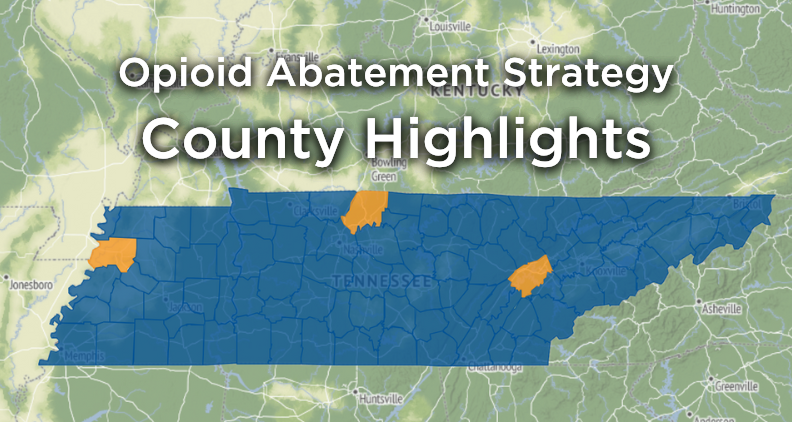East – Roane County
Roane County has been awarded the Excellence in the Application of the Opioid Litigation Principles. These principles, crafted by a coalition of organizations across the substance use field and expert faculty from the Johns Hopkins Bloomberg School of Public Health, represents a set of evidence-based strategies designed to guide state and local policymakers on effective use of national settlement funds.
This award recognizes Roane County’s exemplary adherence to the following Principles:
1. Spend the Money to Save Lives
2. Use Evidence to Guide Spending
3. Invest in Youth Prevention
4. Focus on Racial Equity
5. Develop a Fair and Transparent Process for Deciding Where to Spend the Funding
Roane County formalized its Opioid Settlement Funds Advisory Committee in April 2023. The group is comprised of a diverse panel of over two dozen local stakeholders ranging from service providers to employers to local residents with lived experience in recovery. The committee convenes monthly to share information and develop data-driven, collaborative strategies for the effective spending of opioid settlement funds for the county government to consider.
Roane worked closely with Sarah McCall, UT SMART’s substance use response consultant for East Tennessee, during phase one of the committee’s approach, which involved identifying gaps in services to determine priority spending areas. This involved the creation and maintenance of a living recovery ecosystem resource map, based on a design created by the East Tennessee State University Addiction Science Center. These efforts led to the committee’s prioritization to enhance peer support and trauma-informed care. (UT SMART and partners ETSU, UT Martin and UT Southern have been awarded a UT Grand Challenges grant to expand this resource map across the state).
The phase one proposal was unanimously approved by the Roane County Commission in December 2023, funding an emergency department recovery navigator, a community peer navigator for justice-involved people with substance use disorder, and a trauma-informed specialist to work with at-risk youth and families through the local school system.
In phase two the Roane County Opioid Settlement Funds Advisory Committee is developing a comprehensive three-year strategic plan to manage settlement funds equitably and effectively, and to serve in an advocacy capacity for this mission.
Middle – Sumner County
The Sumner County Opioid Abatement Committee (OAC) has focused on immediate and long-term goals with their funding. In doing so, the committee has set aside half of its funds from each year to focus on projects that could continue once the settlement funding ends.
For year one, Highpoint Health hospital, Volunteer Behavioral Health, the Sumner Prevention Coalition, and multiple county departments have come together to create a plan that will focus on those needing immediate assistance. As the data show that 51% of all those who overdose go to Highpoint Health for medical attention, the goal will be to increase warm handoffs from the emergency department to local mental health and recovery services to improve the continuity of care and get more people who overdose into sustained recovery.
For the upcoming OAC meeting, these applicants will present the project and request the funding. For year two, the OAC has set aside funds to assist the Recovery Court with an anticipated project to be named in November.
Trevor Henderson, UT SMART’s substance use response consultant for Middle Tennessee, has been working closely with the county to highlight the wide range of perspectives represented in these initiatives. The county departments involved (Health, Emergency Communications, Emergency Medical Services and Finance) cover a wide array of government services and logistics that complement the experiences from the region’s flagship hospital and mental healthcare services alongside the county’s prevention coalition. The crucial impact of this range of experiences is the breaking down of data and information silos, which are often a barrier to evidence-based decision-making.
West – Dyer County
Dyer County reached an important milestone in the formation of its own regional opioid abatement committee. The county is now developing a community grant model so that local treatment, prevention, harm reduction and recovery support organizations can apply for funding.
UT SMART is bringing particular attention to the makeup of the Dyer County Opioid Abatement Committee, which features public health, health education, fire and first response, child abuse prevention, faith-based and women-focused recovery support, governmental officials (featuring the budget committee), law enforcement, and criminal justice. This breadth of experience and perspectives covers nearly the entirety of the prevention and recovery ecosystem, which is essential to tackling this crisis.
Officials from Dyer County were first served by UT SMART at the West Tennessee Opioid Settlement Summit, hosted by Tipton County. Courtney Collier, UT SMART’s substance use response consultant for West Tennessee, has since worked closely with Dyer County Mayor David Quick to assist in forming the committee and the community grant process.

